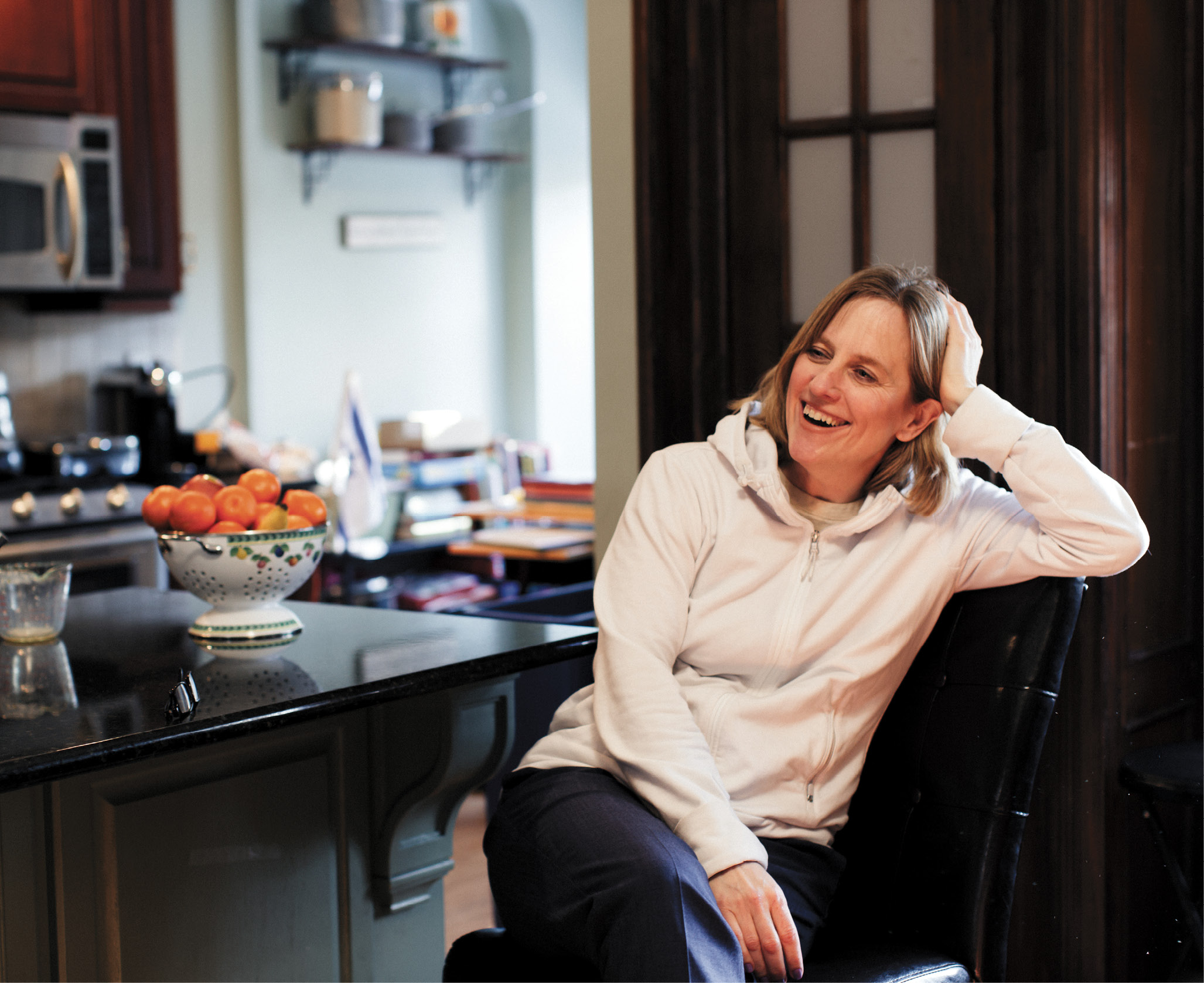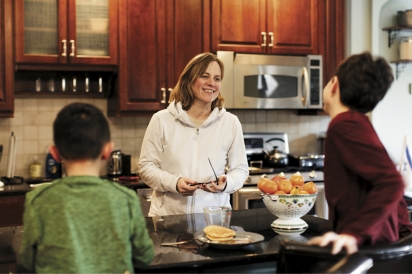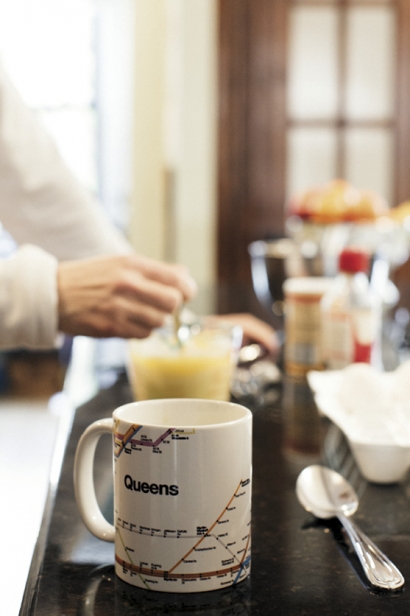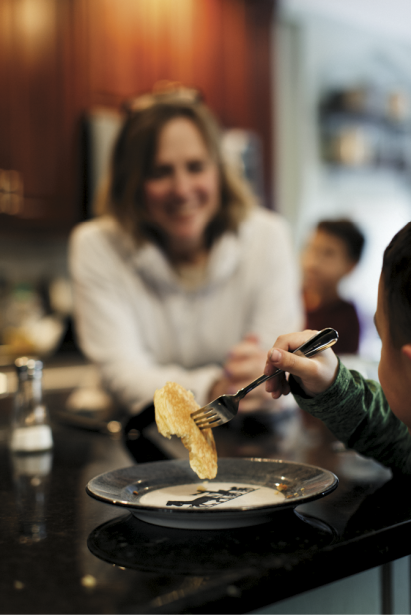The Queens Borough President with a Knack for Good Pancakes
In the kitchen with Queens Borough President, Melinda Katz, talking Mickey Mouse pancakes, Haitian comfort food, and the perfect pierogi with the Forest Hills native.
Melinda Katz was born and raised in this house, a 1937-constructed beaut in Forest Hills. She’s never lived beyond the walls of this cheery Tudor townhouse, save for her four years as a student at the University of Massachusetts at Amherst—and even there, she remained on the 17th floor of the John Quincy Adams Hall (JQA) high-rise dorm throughout her matriculation. For three of those years, Katz occupied the same room, a coveted single.
She’s made her grandmother’s recipe for “Mickey Mouse pancakes”—dubbed as such for the simple addition of two batter-blob ears to the traditional fried round—since her sons, ages 9 and 6, were born. She decided to bear those children at the mature age of 42. She was a New York City Councilwoman until running for City Comptroller in 2009, and when she didn’t win the office, she prepped on her laurels, geared up and tried again with a successful run for Queens Borough President in 2013.
Katz is nothing if not deliberate and consistent.
She does things that are incredibly bold, that thrust her into the limelight—like singing in the college chorus, performing in a country-western band that played at bars in her college town, to say nothing of her tabloid-documented relationship with the radio personality and Guardian Angels founder Curtis Sliwa. And then, the ultimate all-eyes-on-me role, holding public office—yet she does it all in a quiet, canny manner. She—says with a laugh—followed her father’s wishes that she shun the musician’s life, choosing instead the “stable” path of politician, with a fallback career as a lawyer.
“The joke was on him,” however. “I would not say politics is a more stable career [more laughter], but it’s the path I chose.” Truth be told, she’s not so different from her arts-centric family.
Demonstrating her Mickey Mouse pancake-making prowess, she cracks eggs into a pillow of flour as she talks about her parents’ ethos, and how she feels she is carrying on their legacy.
“Their lives were this borough, the city. They felt that the culture and the arts were the most important components of a child’s education. They didn’t feel like they had an education unless they had that component. And so here we are.”
Her father, the late maestro David Katz, founded the Queens Symphony Orchestra in 1953. His family immigrated to Mishawaka, Indiana, from Hungary and Romania, and he made his way to New York City on a fellowship to study at Juilliard, where he met Katz’s mother, the late Jeanne Dale Katz. Jeanne was already a seasoned performer before Juilliard; leaving her home in Manitoba, Canada, she performed in the United Service Organizations, entertaining the troops during WWII. Afterwards, she landed in New York City, married David and founded the Queens Council for the Arts in 1966. Katz grew up one floor above the first office of the Queens Symphony Orchestra which was in the basement of the house she still lives in.
The co-ed who belted out country ditties to beer-guzzling honky-tonk aficionados isn’t such a departure from the blonde, blazered powerhouse commanding a courtroom, and these days, cutting ribbons for playground openings and rallying business leaders at Chamber of Commerce meetings that draw crowds in the hundreds. To look closely is to see that she’s still carrying on her family’s performing traditions. And you can still catch the professionally trained singer crooning these days—she regularly sings "The Star Spangled Banner" with gusto at veteran and memorial events, cancer walks and the like.
It’s her father who taught her how to manage as a single parent. Her mother died when she was 3 years old, and the widower was left to raise her alone, so Katz’s home life was not so traditional.
“A real hippie from back in the day,” as Katz describes him, he did the best he could, with the help of a hired village. Katz credits most of her raising to her Haitian au pair who spent days teaching her to speak Creole and whipping up comfort foods like chicken with rice and beans and macaroni and cheese.
“It’s hard to do it when you don’t have the parent cooking,” she says. “It’s a hard thing to cook, work, take care of the kids, you know? But he managed well.”
Katz adds that sitting down for a meal as a family was the most important tenet her father taught her, so these days, she heads home from Borough Hall every afternoon, like clockwork, and prepares a meal to share with her sons around the black granite kitchen island, a new addition to the home that was recently renovated.
“Very few mothers have that benefit. I’m lucky, there’s no doubt about that,” she said. Katz adheres to a strict no-tech policy at the dinner table so the family can connect on a deeper level.
“You have to eat and talk about the day,” she says. “See who picked on them and who was nice to them, and what grades they got on their exams and things like that. And I also believe that every family does what they need to do to get through the day, so I get that. However people choose to do it, it’s what they choose. For my family it works that that’s the time when we really talk. And you know, I try to teach them some responsibility in those conversations, when it comes to eating. Put your plates in the sink and stuff like that.”
Katz comes from a long line of hearty eaters—her mother was Ukrainian, and raised in Winnipeg, Manitoba, where food traditions were hardscrabble, and there was no choice but to live off the land. Her father was Hungarian and Romanian. The family recipe box is full of directions for pierogies, kolaches, peanut butter cookies and borscht, the Ukrainian way, with cabbage instead of beets.
The Katz family summered in Upstate New York when Melinda was a child, and it was there that aunts and uncles would gather from re-settled homes in Canada and Chicago. Expanding throughout the ginormous kitchen, they’d spend entire days handcrafting pierogies for the whole tribe.
Born into a family of immigrants, Katz’s pro-immigrant stances are none too surprising. She speaks of the borough’s 135-plus languages spoken and 120-plus countries represented with pride. When Immigration and Customs Enforcement (ICE) agents showed up at the Queens County Criminal Courts with the intent of apprehending a Chinese woman in the Human Trafficking Intervention Courtroom, Katz spoke out on behalf of trafficked sex workers, shaming the double victimization of women.
“Women shouldn’t have to make a choice between reporting abusers for instance, or harassers, and getting deported.”
In her tenure as an Assembly Member, Katz authored 16 bills that became laws, including the law requiring HMOs to provide women with direct access to gynecological care without being forced to first see a primary care physician. She’s also carried several bills to increase penalties for assault.
When ICE agents showed up at a school this year, Katz applauded Mayor Bill de Blasio’s statement putting the kibosh on such harassments. Speaking from a mama bear’s perspective, she told me, “I have two kids in school. No one’s allowed to come in and talk to my children without me. Nobody.”
Speaking of the kiddos, the boys’ au pair, Camille, stopped by the house before going to carpool pickup. As she left with the car keys, Katz called after her in her gruff alto, “Remind them we’re having snacks whether they like it or not!” She means business, but the imperative is always accentuated with a smile. Carter and Hunters’ exuberant entrance home from school bookmarked the end of my visit to the Katz home.
Her youngest has Hebrew school, and there’s homework to be done. Camille is from the south of France, and she makes crepes for them; she teaches the boys fragments of her language. Life repeats itself.








